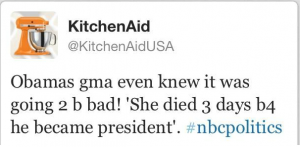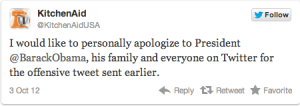Subscribe: Apple Podcasts | Android | RSS
[display_podcast]
During the Presidential debate on October 3, 2012, the person handling the KitchenAid account tweeted this:
The tweet was deleted almost immediately but not, of course, before it was screen grabbed and retweeted to death.
And then something surprising happened. KitchenAid caught their mistake and handled it. Immediately.
And then, Cynthia Soledad emailed Mashable to say:
During the debate tonight, a member of our Twitter team mistakenly posted an offensive tweet from the KitchenAid handle instead of a personal handle. The tasteless joke in no way represents our values at KitchenAid, and that person won’t be tweeting for us anymore. That said, I lead the KitchenAid brand, and I take responsibility for the whole team. I am deeply sorry to President Obama, his family, and the Twitter community for this careless error. Thanks for hearing me out.
And then she tweeted directly to the President to apologize.
Joe Thornley, Martin Waxman, and I (Gini Dietrich) discuss this topic, why it’s news, and whether or not it was crisis well done.
We also talk about the trend of social TV and how big real-time events, such as the debates or the Olympics or the Academy Awards, create an opportunity for each of us to have a voice via the social networks as we’re watching.
********************************************
Earlier this month, Darren Barefoot challenged The Globe & Mail for not linking to an Inc. article they wrote about and for using a much too similar “link bait” headline (which was changed when Barefoot emailed the business editor).
The real meat of the discussion comes when he says in his blog post:
In our remix culture, I feel strongly that we ought to, whenever possible, acknowledge our antecedents. It would have been easy for the Globe to recognize and link to Inc. in the text of the article (“In August, Inc. asked the question…”) or in a footer at the end of the article.
We discuss (and don’t all necessarily agree) on whether or not journalists should be required to link to sources of inspiration.
********************************************
Send us an email or an audio comment to [email protected], join the Inside PR Facebook group, leave us a comment here, message us @inside_pr on Twitter, or connect with Gini Dietrich, Joe Thornley, and Martin Waxman on Twitter. Our theme music was created by Damon de Szegheo; Roger Dey is our announcer. Inside PR is produced by Kristine Simpson.




Thanks for discussing my piece. I posted a link back to this episode (whether or not I’m ethically obligated too).
I’m a little late with my reply, but I just discovered your podcast and this newsjacking discussion caught my attention. From an ethical standpoint I feel there is an obligation to disclose sources and give credit to the original poster. These mainstream publications somehow believe they can play by different rules and it disgusts me.